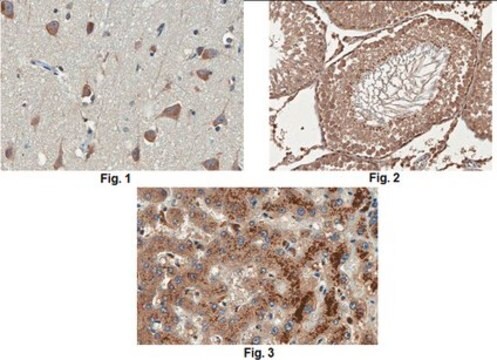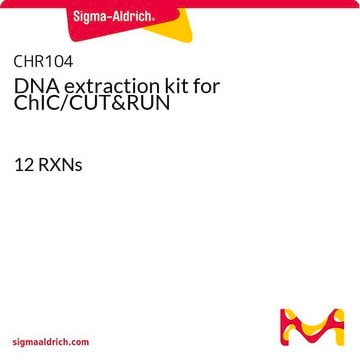Recommended Products
manufacturer/tradename
Chemicon®
Quality Level
technique(s)
DNA extraction: suitable
application(s)
sample preparation
shipped in
wet ice
General description
Intended Use
The BacterialXpress nucleic acid extraction kit is intended for the purification of bacterial DNA from plasma, serum, cerebral spinal fluid, amniotic fluid, tissue, bone marrow, and cell culture. The BacterialXpress kit provides a rapid method for the extraction and purification of amplification-competent nucleic acids; however, the kit does not separate DNA from RNA. The BacterialXpress nucleic acid extraction kit can be used for the extraction and purification of a broad range of bacterial DNA from a variety of sources. However, performance cannot be guaranteed for all bacteria from all sources.
FOR LABORATORY USE ONLY; not for use in diagnostic procedures.
The BacterialXpress nucleic acid extraction kit is intended for the purification of bacterial DNA from plasma, serum, cerebral spinal fluid, amniotic fluid, tissue, bone marrow, and cell culture. The BacterialXpress kit provides a rapid method for the extraction and purification of amplification-competent nucleic acids; however, the kit does not separate DNA from RNA. The BacterialXpress nucleic acid extraction kit can be used for the extraction and purification of a broad range of bacterial DNA from a variety of sources. However, performance cannot be guaranteed for all bacteria from all sources.
FOR LABORATORY USE ONLY; not for use in diagnostic procedures.
Application
Research Category
All
All
Suitable for the purification of bacterial DNA from plasma, serum, cerebral spinal fluid, amniotic fluid, tissue, bone marrow, and cell culture.
Packaging
50 Extractions
Components
Bacterial DNA Extraction reagent - (Part No. 5539) - (1 bottle, 11.0 mL).
Storage and Stability
BacterialXpress references a 2-8°C storage temperature, however, the product can also be stored at room temperature upon arrival. Product is stable up to the expiration date printed on the kit label at 2-8°C or at room temperature. Reagent will crystallize upon storage at 2-8°C and should be re-dissolved with gentle warming at 37° C before use.
WARNINGS AND PRECAUTIONS:
The BacterialXpress nucleic acid extraction reagent removes endogenous nucleases. Certified nuclease-free plasticware should be used whenever possible and work surfaces should be cleaned frequently with a diluted bleach solution to reduce the possibility for nuclease contamination.
Proper aseptic technique should be used when working with potentially infectious material. The BacterialXpress reagent contains a chaotropic salt, which is an irritant and is not compatible with disinfecting agents that contain bleach.
Dispose chaotropic salt containing solutions and plasticware according to your institutions waste-disposal guidelines.
The BacterialXpress reagent contains chaotropic salts, which may irritate the skin and damage clothing. As with any extraction procedure, use gloves, a laboratory coat and safety goggles. Avoid breathing vapors. In case of contact, immediately flush eyes or skin with a large amount of saline or water for at least 15 minutes.
DO NOT ALLOW THE EXTRACTION REAGENT TO COME IN CONTACT WITH BLEACH.
WARNINGS AND PRECAUTIONS:
The BacterialXpress nucleic acid extraction reagent removes endogenous nucleases. Certified nuclease-free plasticware should be used whenever possible and work surfaces should be cleaned frequently with a diluted bleach solution to reduce the possibility for nuclease contamination.
Proper aseptic technique should be used when working with potentially infectious material. The BacterialXpress reagent contains a chaotropic salt, which is an irritant and is not compatible with disinfecting agents that contain bleach.
Dispose chaotropic salt containing solutions and plasticware according to your institutions waste-disposal guidelines.
The BacterialXpress reagent contains chaotropic salts, which may irritate the skin and damage clothing. As with any extraction procedure, use gloves, a laboratory coat and safety goggles. Avoid breathing vapors. In case of contact, immediately flush eyes or skin with a large amount of saline or water for at least 15 minutes.
DO NOT ALLOW THE EXTRACTION REAGENT TO COME IN CONTACT WITH BLEACH.
Legal Information
CHEMICON is a registered trademark of Merck KGaA, Darmstadt, Germany
Disclaimer
Unless otherwise stated in our catalog or other company documentation accompanying the product(s), our products are intended for research use only and are not to be used for any other purpose, which includes but is not limited to, unauthorized commercial uses, in vitro diagnostic uses, ex vivo or in vivo therapeutic uses or any type of consumption or application to humans or animals.
General Lab Use
General Lab Use
Signal Word
Danger
Hazard Statements
Precautionary Statements
Hazard Classifications
Acute Tox. 4 Dermal - Acute Tox. 4 Inhalation - Acute Tox. 4 Oral - Aquatic Chronic 3 - Eye Dam. 1 - Skin Corr. 1C
Supplementary Hazards
Storage Class Code
8A - Combustible corrosive hazardous materials
WGK
WGK 2
Certificates of Analysis (COA)
Search for Certificates of Analysis (COA) by entering the products Lot/Batch Number. Lot and Batch Numbers can be found on a product’s label following the words ‘Lot’ or ‘Batch’.
Already Own This Product?
Find documentation for the products that you have recently purchased in the Document Library.
Fieke Lamers et al.
European journal of cancer (Oxford, England : 1990), 48(16), 3093-3103 (2012-03-01)
Genomic aberrations of key regulators of the apoptotic pathway have hardly been identified in neuroblastoma. We detected high BCL2 mRNA and protein levels in the majority of neuroblastoma tumours by Affymetrix expression profiling and Tissue Micro Array analysis. This BCL2
Our team of scientists has experience in all areas of research including Life Science, Material Science, Chemical Synthesis, Chromatography, Analytical and many others.
Contact Technical Service








